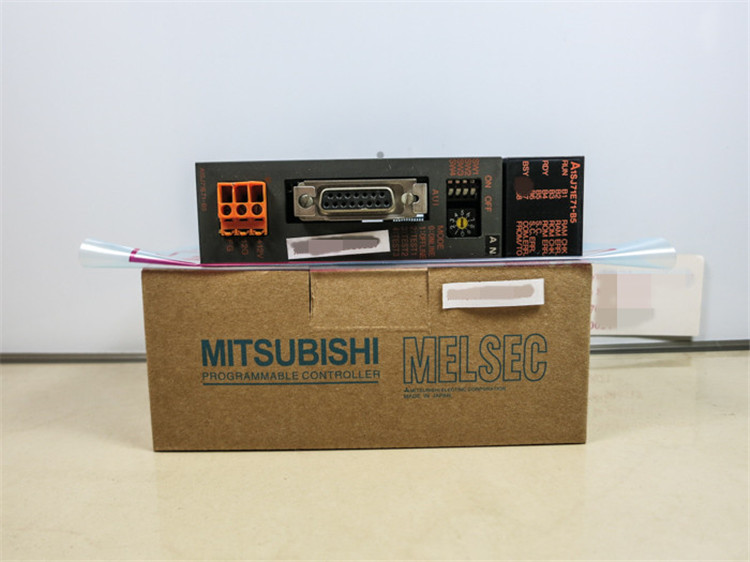Home
>> Products
>> MITSUBISHI
>> Ans/QnAs series PLC
>> MELSECNET/10 module
>> A1SJ71E71-B5 Network module
A1SJ71E71-B5 Network module
MITSUBISHI A1SJ71E71-B5 Manual And Instructions
A1SJ71E71-B5 datasheetPDF datasheet
MITSUBISHI A1SJ71E71-B5 Product information and technical parameters:
Brand: MITSUBISHI
Name: Network module
Model: A1SJ71E71-B5
...More relevant models >>>>
A1SJ71E71-B5 datasheetPDF datasheet
MITSUBISHI A1SJ71E71-B5 Product information and technical parameters:
Brand: MITSUBISHI
Name: Network module
Model: A1SJ71E71-B5
Input: AC100 ~ 120V/200 ~ 240V,
Output: 3A/DC24V 0.6A DC5V.
PLC programming has a wide range of applications, powerful, easy to use, has become one of the main devices of modern industrial automation,
In all areas of industrial production has been widely used,
Applications in other areas (such as civil and home automation) have also been rapidly developed A1SJ71E71-B5.
It uses programmable memory,
An instruction used to perform logical operations, sequence control, timing, counting and arithmetic operations in its internal storage,
And through digital, analog input and output,
Control of various types of machinery or production processes A1SJ71E71-B5 Programmable controller and related equipment,
Should be easy to make the industrial control system to form a whole, easy to expand the principle design of its functions A1SJ71E71-B5.
As can be seen from the above definition, PLC is a program to change the control function of the industrial control computer,
In addition to the completion of a wide variety of control functions, as well as with other computer communications networking features. Input points: 32 points.
Input voltage and current: 7mA DC24V A1SJ71E71-B5.
Input response time: 10ms.
16 point /1 a public side.
Positive pole sharing.
Output points: 24 points.
Output voltage: DC24V/AC240V, 2A/1 point, 5A/1 common end.
Output response time: 12ms.
Output type: relay output.
8 point /1 a public side.
34 point terminal station.
PLC is introduced by the relay control technology after the development of micro processing technology,
Can be easily and reliably used for switching control.
As the analog quantity can be converted into digital quantity, the number of digital quantity is just a number of switching value,
Therefore, after the conversion of analog, PLC can also be reliable for processing control.
Because the continuous production process often has the analog quantity, the analog quantity control is sometimes called process control.
Analog quantity is not electricity, and PLC can only handle digital quantity, quantity of electricity.
All to realize the conversion between them to have the sensor, the analog quantity into a number of power.
If this power is not standard, but also through the transmitter,
The non-standard power into a standard electrical signal, such as 1-5V, 4-20mA, 0-10V, etc..
At the same time, there is also an analog input unit (A/D),
Transform these standard elecctrical signals into digital signals,
The analog output unit (D/A), in order to transform the digital quantity after PLC processing into analog quantity -- standard electric signal A1SJ71E71-B5.
So the standard telecommunication number, the conversiion between the number of operations to use a variety of computing A1SJ71E71-B5.
This requires the resolution of the analog unit and the standard electrical signal.
Output: 3A/DC24V 0.6A DC5V.
PLC programming has a wide range of applications, powerful, easy to use, has become one of the main devices of modern industrial automation,
In all areas of industrial production has been widely used,
Applications in other areas (such as civil and home automation) have also been rapidly developed A1SJ71E71-B5.
It uses programmable memory,
An instruction used to perform logical operations, sequence control, timing, counting and arithmetic operations in its internal storage,
And through digital, analog input and output,
Control of various types of machinery or production processes A1SJ71E71-B5 Programmable controller and related equipment,
Should be easy to make the industrial control system to form a whole, easy to expand the principle design of its functions A1SJ71E71-B5.
As can be seen from the above definition, PLC is a program to change the control function of the industrial control computer,
In addition to the completion of a wide variety of control functions, as well as with other computer communications networking features. Input points: 32 points.
Input voltage and current: 7mA DC24V A1SJ71E71-B5.
Input response time: 10ms.
16 point /1 a public side.
Positive pole sharing.
Output points: 24 points.
Output voltage: DC24V/AC240V, 2A/1 point, 5A/1 common end.
Output response time: 12ms.
Output type: relay output.
8 point /1 a public side.
34 point terminal station.
PLC is introduced by the relay control technology after the development of micro processing technology,
Can be easily and reliably used for switching control.
As the analog quantity can be converted into digital quantity, the number of digital quantity is just a number of switching value,
Therefore, after the conversion of analog, PLC can also be reliable for processing control.
Because the continuous production process often has the analog quantity, the analog quantity control is sometimes called process control.
Analog quantity is not electricity, and PLC can only handle digital quantity, quantity of electricity.
All to realize the conversion between them to have the sensor, the analog quantity into a number of power.
If this power is not standard, but also through the transmitter,
The non-standard power into a standard electrical signal, such as 1-5V, 4-20mA, 0-10V, etc..
At the same time, there is also an analog input unit (A/D),
Transform these standard elecctrical signals into digital signals,
The analog output unit (D/A), in order to transform the digital quantity after PLC processing into analog quantity -- standard electric signal A1SJ71E71-B5.
So the standard telecommunication number, the conversiion between the number of operations to use a variety of computing A1SJ71E71-B5.
This requires the resolution of the analog unit and the standard electrical signal.
...More relevant models >>>>
Related download


 Last one:
Last one:  next one:
next one: